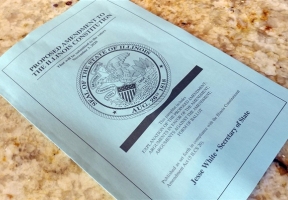
In one year, on Nov. 8, 2022, Illinois voters will determine the fate of Amendment 1, a ballot measure that would enshrine collective bargaining rights in the Illinois Constitution and allow government union contracts to override any other state law. Billed as a ban on “right-to-work” laws, Illinois Policy Institute analysis finds this amendment goes further and would give government union leaders more power than state lawmakers or even voters have. “Amendment 1 would lead to the most extreme government union leader power in the nation, as 28 state constitutions don’t even mention labor issues,” Mailee Smith, director of labor policy for the nonpartisan Illinois Policy Institute, said. “There would be no limit on what government unions could demand and no limit on what state and local governments could give away. Because of this, new costs are bound to appear for taxpayers, piling onto the fiscal challenges the state faces.”
What would Amendment 1 do?
Amendment 1 would be the first constitutional amendment of its kind in the nation. It would place four distinct labor provisions in the Illinois Constitution:
Allow collective bargaining negotiations over limitless subjects. Government unions would have the right to bargain over any subject in union contract negotiations – from salary, benefits and work conditions to economic welfare matters – and the scope could never be limited by lawmakers. This could lead to longer contract negotiations and more strikes.
Make organizing and bargaining a “fundamental right” for any government employee. It would apply the right to collectively bargain to any employee, without definition, which could lead to a broad range of government employees such as high-ranking government workers or lawmakers unionizing.
Prohibit lawmakers from interfering with, negating or diminishing union power. Amendment 1 would prevent any future legislation reining in collective bargaining, its terms, or subjects, or even restricting government strikes.
Ban right-to-work laws. Illinois already prohibits right-to-work laws and this amendment would be the first to add the ban to the constitution. In comparison, nine other state constitutions include right-to-work language, granting workers the ability to determine for themselves whether to join and pay a union.
To read more about the potential effects of Amendment 1, visit illin.is/amendment1.













